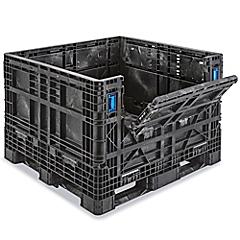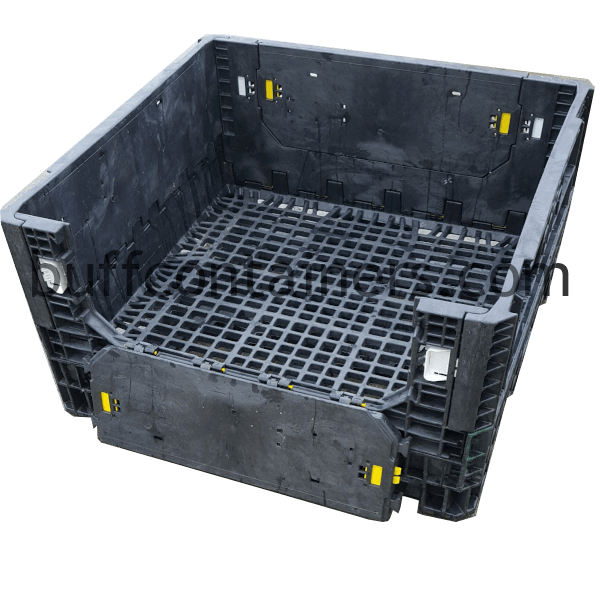The Duty of Mass Plastic Containers in Effective Recycling Practices and Sustainability
Bulk plastic containers are integral to modern-day recycling initiatives. Their layout improves the efficiency of product collection and transportation, contributing to sustainability objectives. These containers not only enhance space however likewise assist in monitoring contamination degrees. However, their implementation is not without challenges. Comprehending the complete extent of their effect exposes an intricate connection in between logistics and environmental responsibility that warrants additional expedition.
Understanding Mass Plastic Containers
Mass plastic containers work as an essential component in different markets, promoting the storage and transport of goods. These containers are usually made from robust materials such as high-density polyethylene (HDPE) or polypropylene, which give sturdiness and resistance to environmental aspects. Their design usually consists of functions like stackability and modularity, enabling effective use room during both storage and transit.
Industries such as agriculture, food processing, and making regularly make use of bulk plastic containers because of their light-weight nature and convenience of handling. The containers are available in numerous dimensions and arrangements, dealing with the specific demands of different items. Their convenience extends beyond simple functionality; they can also be customized with lids, handles, and classifying options to improve functionality - plastic bulk containers. Because of this, bulk plastic containers play a critical function in enhancing logistics and supply chain operations throughout multiple sectors, thus adding to overall performance and cost-effectiveness
Advantages of Utilizing Bulk Plastic Containers in Recycling
When organizations focus on reusing initiatives, the utilization of bulk plastic containers substantially boosts the efficiency of the process. These containers are designed to optimize area, allowing for the storage and transportation of bigger quantities of recyclable materials. This leads to less journeys to recycling centers, thereby reducing gas usage and associated emissions.
Additionally, bulk plastic containers are resistant and long lasting to numerous environmental variables, guaranteeing that materials remain protected throughout handling and transportation. Their light-weight style additionally contributes to reduce transport prices.
Moreover, the uniformity of these containers facilitates better sorting and processing of recyclable materials, which can improve general recycling rates - plastic bulk containers. Organizations that embrace bulk plastic containers also demonstrate a dedication to sustainability, favorably influencing their brand name image. Eventually, these advantages not only streamline reusing techniques but additionally add to wider environmental goals
Exactly How Mass Plastic Containers Facilitate Material Collection
Reliable product collection is considerably boosted by the use mass plastic containers, as they provide a effective and structured service for collecting recyclable products. These containers are made to suit large volumes of materials, which simplifies the sorting and storage process. Their stackable layout optimizes area use, making it easier for facilities to arrange recyclables without clutter.
On top of that, mass plastic containers are weather-resistant and durable, enabling outdoor placement without destruction. This durability ensures that products stay protected up until they are gathered for processing.

The uniformity in shapes and size of these containers assists in standardization throughout collection points, enabling far better monitoring of recyclable volumes. In addition, their clear nature permits very easy exposure of contents, assisting in the tracking of contamination degrees and ensuring that just appropriate products are accumulated. Generally, mass plastic containers play a crucial function in enhancing the material collection process, thus promoting efficient recycling methods.
Transportation Effectiveness and Environmental Effect
Transportation effectiveness plays an essential role in the recycling process, particularly through the optimization of lots capability in mass plastic containers. By making the most of the volume of material transported, business can considerably decrease the variety of trips required, thereby minimizing their carbon footprint. This method not only boosts operational effectiveness however also adds to a lot more lasting ecological techniques.

Maximizing Tons Capability
Although optimizing tons capacity is typically neglected, it plays a necessary duty in boosting transport performance and reducing ecological impact in recycling practices. By taking full advantage of the quantity that bulk plastic containers can hold, recycling procedures can reduce the number of trips needed for transportation. This not only decreases gas intake but also lowers the wear and tear on automobiles. Reliable tons administration enables centers to make use of space efficiently, making sure that each transport cycle is as efficient as feasible. Additionally, well-optimized lots can lead to better negotiations with logistics carriers, possibly minimizing overall expenses. Eventually, boosting load capability contributes to a more sustainable reusing system by cultivating reliable resource usage and decreasing waste generated during transportation.
Decreasing Carbon Footprint
As reusing operations venture to reduce their ecological effect, decreasing the carbon footprint related to transport becomes an essential objective. Mass plastic containers play an important duty in accomplishing this goal by improving tons performance and enhancing logistics. Their lightweight yet resilient style permits maximum freight area usage, lowering the number of journeys needed to move products. By consolidating deliveries, recycling centers can lower gas consumption and greenhouse gas exhausts. On top of that, strategically locating recycling facilities minimizes transportation ranges, additionally reducing carbon outcomes. Additionally, employing fuel-efficient cars and alternative energy sources improves overall sustainability. By incorporating these techniques, the recycling sector can appreciably decrease its carbon footprint, adding to an extra sustainable future.
Challenges in using Mass Plastic Containers

Contamination Problems
Contamination concerns stand for a substantial obstacle in the efficient usage of mass plastic containers within recycling techniques. These containers often gather residues from previous Extra resources contents, resulting in combined materials that can impede the recycling process. Contaminants such as food waste, chemicals, or non-recyclable products can endanger the stability of the whole set, causing enhanced disposal prices and reduced recycling prices. Furthermore, incorrect cleansing or sorting can worsen these issues, making it difficult for recycling facilities to process materials successfully. The existence of pollutants not only impacts the top quality of recycled products but likewise weakens the total sustainability initiatives targeted at lowering plastic waste. Attending to these contamination challenges is essential for enhancing the efficacy of mass plastic container recycling.
Recycling Infrastructure Limitations
Inadequacy in recycling facilities presents significant obstacles for the reliable management of mass plastic containers. Numerous recycling centers do not have the capability to process huge volumes of these containers efficiently, resulting in raised delays and expenses. Inadequate arranging modern technologies often lead to contamination, as bulk containers might be mixed with various other products, complicating the reusing procedure. Minimal transport options also impede the activity of mass plastic containers to suitable reusing facilities, leading to enhanced landfill waste. Furthermore, an absence of standardized methods for mass container recycling produces confusion among customers and companies, even more making complex initiatives to advertise sustainability. Dealing with these facilities limitations is vital to enhance reusing techniques and maximize the possibility of bulk plastic containers in a round economic climate.
Finest Practices for Carrying Out Bulk Plastic Containers
When companies consider carrying out mass plastic containers in their recycling methods, they must focus on a strategic strategy that boosts effectiveness and minimizes contamination threats. First, picking the appropriate container dimension and kind is vital to fit the volume of materials being processed. Organizations needs to likewise develop clear labeling and signs to assist users on correct disposal methods, minimizing confusion and errors. Routine training sessions for team can further strengthen these techniques, making certain everyone understands their roles in preserving recycling stability.
Additionally, companies must apply a routine maintenance routine to examine and tidy containers, avoiding the build-up of pollutants. Partnering with local reusing facilities can additionally streamline the collection procedure, guaranteeing that materials are efficiently refined. Companies ought to keep an eye on and evaluate their recycling metrics, utilizing this data to refine methods over time and advertise continual renovation in their sustainability efforts.
The Future of Bulk Plastic Containers in Lasting Practices
As companies increasingly focus on sustainability, the function of bulk plastic containers in recycling techniques is readied to develop considerably. Developments in materials science are bring about the growth of recyclable and eco-friendly alternatives, enhancing the environmental advantages of bulk plastic containers. Additionally, the implementation of closed-loop systems will permit less complicated collection and repurposing of these containers, reducing waste and source consumption.
Technical developments, such as wise radar, will certainly make it possible for firms to keep an eye on the lifecycle of bulk containers, improving performance in reusing procedures. As consumer demand for sustainable methods expands, organizations will likely adopt mass plastic containers made for reuse and long-lasting worth. Partnership between governments and markets will certainly foster the establishment of standardized reusing methods, guaranteeing that mass containers are effectively integrated into broader sustainability campaigns. On the whole, the future of mass plastic containers visit the site shows up appealing, with substantial possibility for adding to a round economy.
Often Asked Concerns
Just How Are Mass Plastic Containers Made and What Products Are Made use of?
Bulk plastic containers are usually made from high-density polyethylene (HDPE) or polypropylene (PP) These materials are refined through injection molding or blow molding methods, causing durable, lightweight containers appropriate for various storage space and transportation needs.
Can Bulk Plastic Containers Be Recycled Numerous Times Before Recycling?
Yes, bulk plastic containers can be reused numerous times before recycling. Their durability and design permit repeated use in different applications, promoting sustainability and resource performance while minimizing the requirement for new containers.

What Qualifications Exist for Mass Plastic Containers in Recycling?
Various qualifications for mass plastic containers include the Recycling Partnership's certification, the Cradle to Cradle Qualified ™ standard, and the Sustainable Product packaging Coalition's standards, making sure containers satisfy certain environmental and recyclability criteria for effective recycling.
Exactly How Do Mass Plastic Containers Compare to Other Recycling Storage Space Options?
Mass plastic containers provide greater toughness and ability contrasted to various other recycling storage alternatives, lowering the risk of contamination and facilitating efficient transport. Their layout supports far better organization, improving general effectiveness in reusing operations.
What Is the Life-span of a Mass Plastic Container in Recycling Processes?
The life expectancy of a mass plastic container in reusing procedures see this here typically varies from 5 to one decade, depending upon use, worldly quality, and ecological problems, permitting for numerous cycles of usage prior to ultimate disposal or recycling.
When companies focus on recycling efforts, the utilization of bulk plastic containers greatly improves the effectiveness of the procedure. Transport efficiency plays a vital function in the reusing process, specifically via the optimization of lots ability in bulk plastic containers. The use of mass plastic containers in recycling practices deals with significant difficulties, especially worrying contamination problems and constraints within recycling facilities. Contamination problems represent a considerable obstacle in the efficient use of bulk plastic containers within recycling practices. When companies consider executing bulk plastic containers in their recycling practices, they must prioritize a tactical approach that boosts efficiency and minimizes contamination dangers.